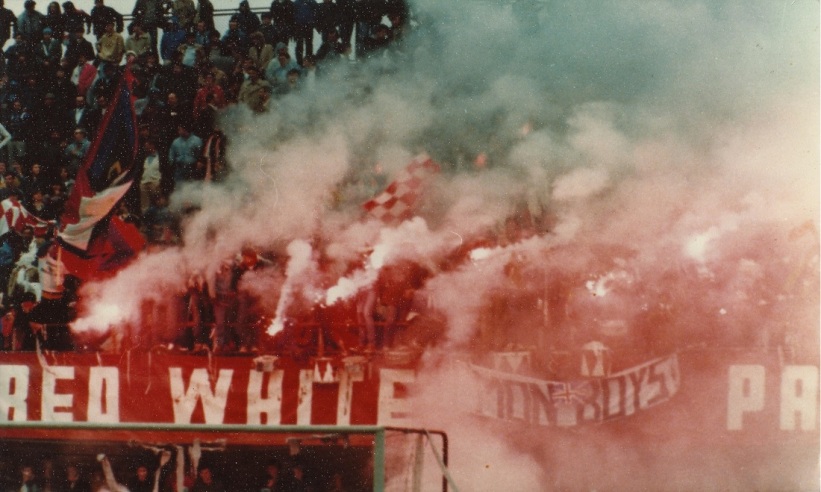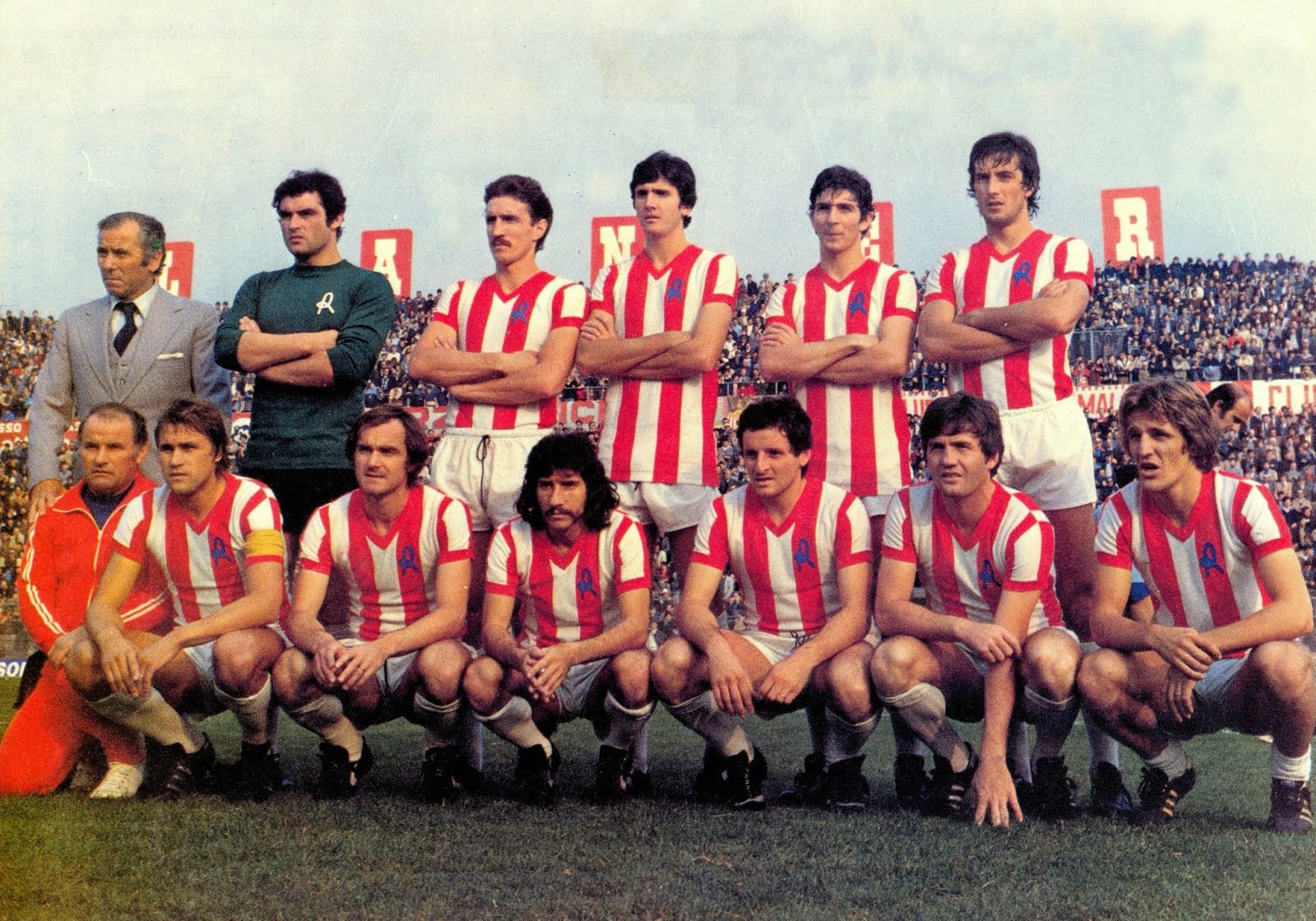The Veneto is a region full of history and culture – from the historic city of Venice, the quaintness of Padua, to fair Verona. In footballing terms, recently it has been the latter flying the flag for the region, with Chievo and Hellas routinely frequenting Serie A. Hellas’ 1985 Scudetto title is a well told story, which to this day engenders fierce pride among the city’s residents. However, it was in Vicenza where the Veneto first made Serie A tremble.
In the summer of 1976, however, Vicenza were making no such waves. In their previous guise as Lanerossi Vicenza, the club had been relegated after 20 years in the top-flight. Club president Giuseppe Farina decided to appoint Giovan Battista Fabbri as Head Coach, which was a surprise to some, seeing as Fabbri had left Piacenza after the club was relegated to Serie C. Those doubts were soon dispelled, however, as Fabbri and Vicenza clinched promotion back to Serie A in his first season.
Now back in the top-flight, a good start to the season was vital but the Lanerossi began the 1977-78 campaign terribly. They failed to win their first five league games – two draws and three defeats. Such an inauspicious start might have prompted a coach to drastically change their tactics. Not Fabbri, who resolutely stuck with the same philosophy, ideas and values that got Vicenza into Serie A.
His brand of football was inspired by Total Football – so effectively introduced by Rinus Michels at Ajax in the early 1970s. Attack was the focal point in Fabbri’s ideology and that was embodied in his attacking trident. At the forefront was a young striker named Paolo Rossi – ably flanked by wingers Franco Cerilli and Roberto Filiippi. While they provided support for Rossi, it was the full backs that provided width, serving a twin purpose to defend but as importantly attack.
Fluidity was the staple of Fabbri’s system, with defenders and midfielders freely alternating positions dependent on the situation. Each player was a vital cog in the machine, which provided Vicenza with a lucidity and creativity in attack, albeit with defensive vulnerability. These vulnerabilities had been punished in the opening games of the season but Fabbri would soon be rewarded for sticking with his methods.
Everything seemed to click in their next game at Atalanta; a comfortable 4-2 win thanks to braces from Paolo Rossi and debutant Mario Guidetti. Achieving their first league win of the season would unleash Vicenza from their shackles. From late October 1977 to late January 1978, the Lanerossi went 11 league games unbeaten, with seven wins and four draws.
At the heart of their blistering form was Paolo Rossi, their impressive run coinciding a purple patch of form for the 21-year-old. Rossi had scored just once during Vicenza’s winless period at the start of the season, but during their unbeaten run scored 11 goals in as many games. Such deadly precision in front of goal was deservedly rewarded by making hid debut for Italy in December.
The emergence of Rossi as one of Italy’s brightest talents had much to do with Fabbri’s vision. Prior to Fabbri’s appointment as Mister, Rossi had been deployed on the right wing to little effect.
Fabbri quickly saw his qualities were best served up front and the positional switch had an instant effect. Rossi blazed a trail of destruction in Serie B, as his 21 goals won him the league’s Golden Boot and propelled the Lanerossi into Serie A. Rossi may have been the figurehead of Vicenza’s form, but the key factor behind the team’s performances lay in the collective. Fabbri instilled in his players a work ethic of selflessness so that each person worked for the team.
The high point of Vicenza’s unbeaten run was their 1-0 victory over Hellas in the Derby del Veneto in late January 1978. The Lanerossi jumped to third position in the league, level on points with Torino, and just two points behind leaders Juventus. Their good form, not to mention their high tempo football, soon caught the attention of fans. Many flocked to the Stadio Romeo Menti to witness and enjoy Vicenza’s success. The club’s attendance record was broken in January 1978 when 31,023 spectators attended Vicenza’s goalless draw versus Juventus.

The Derby del Veneto: One of Italy’s forgotten rivalries
However, Vicenza’s winning streak was ended by Inter in a 2-0 defeat in early February. As a result, Fabbri’s side went through a mini slump in form, suffering back-to-back draws against Torino and AC Milan respectively. These setbacks meant Vicenza dropped to fourth with only 11 league games remaining. Some wondered if Vicenza would peter out now their top-flight status had been secured.
Remarkably, the Lanerossi yet again confounded expectations, as they suffered just the two losses from those 11 league games. Once again, Vicenza’s exhilarating brand of attacking football led to several notable performances away from home, beating Lazio 3-1 and Napoli 4-1. Paolo Rossi yet again led from the front, netting 12 goals in those 11 games, which included a hat-trick at Lazio and the winner against Fiorentina. Their formidable end of season form meant Vicenza finished second in Serie A, their highest ever league position. It was a remarkable achievement for a promoted side. The high-octane football the Lanerossi played under Fabbri led to several landmarks being reached during the 1977-78 season.
Firstly, the Lanerossi were the highest goal-scorers in the division with 50 goals – scoring at least three goals or more in seven of their 30 league games. Secondly, Paolo Rossi’s 24 goals in 30 league games made him the youngest Capocannoniere at the age of 21. In addition, he became the first player to become top scorer in Serie A and Serie B in consecutive seasons. Rossi’s deadly strike rate for Vicenza impressed Italy’s then Head Coach Enzo Bearzot who selected the youngster for the Azzurri’s 1978 World Cup squad. Finally, finishing in second meant Vicenza qualified for the UEFA Cup for the very first time.
These achievements saw Fabbri pick up the individual accolade of Migliore Allenatore – Coach of the Season. To turn a group of unheralded players to Scudetto challengers in less than a year is something few coaches have ever achieved. Giorgio Lago, a prominent Italian journalist, would dub them “Real Vicenza” – the Real Madrid of the provincials. It was a fitting compliment to a provincial club that punched above its weight against many of Italy’s illustrious clubs.
Yet Vicenza’s fall from grace would be as dramatic as a Shakespearean drama. The Lanerossi were knocked out in the first round of the UEFA Cup and struggled to adapt to Serie A teams wise to their tactics.
Despite Rossi’s 15 league goals, Vicenza were relegated from Serie A on the final day of the season, which led to Fabbri’s departure. Paolo Rossi also left to Perugia on loan before making his move to perennial Italian giants Juventus.
The 1977-78 season would prove the pinnacle for Vicenza and one from which they fell swiftly as they dropped to Italy’s third tier in the 1980s. A stint in Serie A during the 1990s rekindled the memories once more, but relegation and more recently falling into controlled administration in 2018 means that past glories now seem more distant than ever.
Now reborn as LR Vicenza Virtus in Italy’s third tier, they are no longer the plucky underdogs of the Veneto. Yet they will always have the memory of “Real Vicenza” – where the giants of Serie A trembled and one day might do so again.
Words by Yousef Teclab: @TeclabYousef

